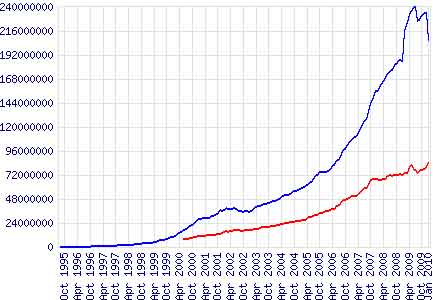
Changes at a Chinese blogging service led to a decline of 27 million sites in the number of global web sites found in the monthly Netcraft Web Server survey for January 2010. The drop was the largest one-month decline ever for the Netcraft survey, which has been a leading benchmark of Internet growth since its debut in August 1995. The shift illustrates how the growth of large blogging and social networking platforms has complicated the challenge of tracking Internet growth.
On Friday Netcraft reported that it found 206,741,990 sites in its January 2010 survey, down sharply from 233,848,493 sites a month earlier. The UK firm attributed the drop to changes at qq.com (Qzone), a blogging platform owned by the Chinese Internet portal TenCent.
"Last year all qq.com blogs were made public, leading to a large number of hostnames being added to the survey in February 2009," Netcraft reported. "However, in the last 6 months qq.com have from time to time made all blogs private again, and have also stopped reporting blog activity to well known syndication points, so Netcraft can no longer tell how many accounts are active."
TenCent said in its Nov. 30 report to investors (PDF) that Qzone had 305.3 million users, while Facebook reported 350 million users the following day.
Netcraft’s survey doesn’t capture all the activity at social networks, and focuses on sites rather than users, a distinction based on exploration of site structure and DNS records that results in reporting primarily of blogs rather than profiles. Netcraft’s search agents likely have difficulty assessing the entirety of social networks with access controls (which may be why it seems to have limited data on Facebook).




